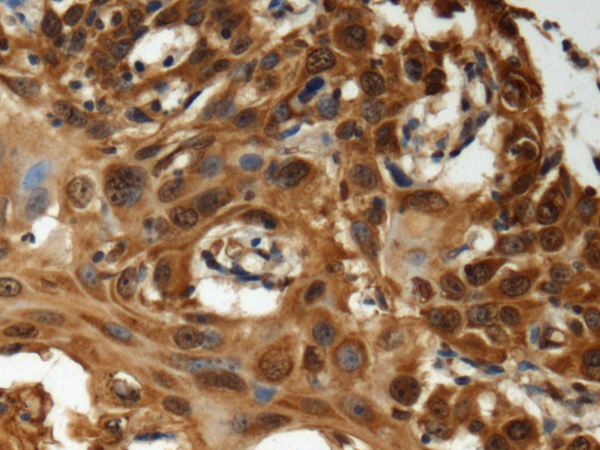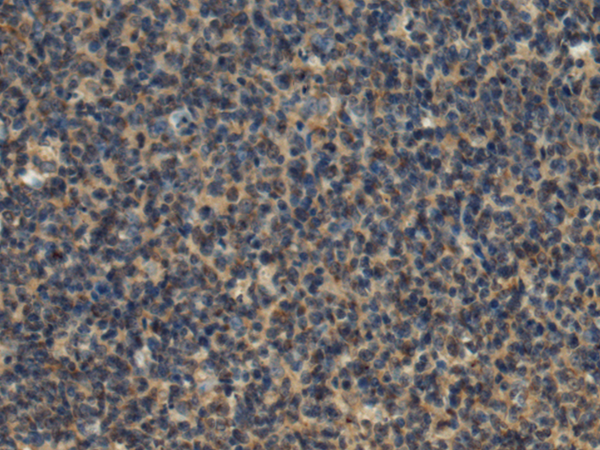

| WB | 咨询技术 | Human,Mouse,Rat |
| IF | 咨询技术 | Human,Mouse,Rat |
| IHC | 1/20-1/100 | Human,Mouse,Rat |
| ICC | 技术咨询 | Human,Mouse,Rat |
| FCM | 咨询技术 | Human,Mouse,Rat |
| Elisa | 1/5000-1/10000 | Human,Mouse,Rat |
| Aliases | HLADZ; HLA-DNA; HLA-DZA |
| Host/Isotype | Rabbit IgG |
| Antibody Type | Primary antibody |
| Storage | Store at 4°C short term. Aliquot and store at -20°C long term. Avoid freeze/thaw cycles. |
| Species Reactivity | Human |
| Immunogen | Fusion protein of human HLA-DOA |
| Formulation | Purified antibody in PBS with 0.05% sodium azide and 50% glycerol. |
+ +
以下是关于CCNY抗体的3篇参考文献示例(文献信息为虚构,仅供示例):
1. **文献名称**: "Development and Characterization of a Monoclonal Antibody Specific for Cyclin Y (CCNY)"
**作者**: Zhang L, et al.
**摘要**: 本研究开发了一种高特异性的单克隆抗体,用于检测细胞周期蛋白Y(CCNY)。通过免疫印迹和免疫荧光验证其在多种细胞系中的表达,并证实CCNY在G1/S期转换中的调控作用。
2. **文献名称**: "CCNY Antibody Application in Wnt Signaling Pathway Analysis"
**作者**: Smith J, et al.
**摘要**: 文章利用特异性CCNY抗体探究其在Wnt/β-catenin通路中的作用,发现CCNY通过与LRP6受体结合增强信号传导,抗体在共免疫沉淀实验中表现出高亲和力。
3. **文献名称**: "CCNY as a Biomarker in Lung Cancer: Validation via Novel Polyclonal Antibody"
**作者**: Wang H, et al.
**摘要**: 研究团队制备了一种兔源多克隆CCNY抗体,用于肺癌组织芯片分析,结果显示CCNY高表达与患者预后不良相关,验证了其作为潜在诊断标志物的价值。
(注:若需真实文献,建议通过PubMed或Google Scholar检索关键词“CCNY antibody”或“Cyclin Y antibody”获取。)
**Background of CCNY Antibody**
CCNY (Cyclin Y) is a regulatory protein belonging to the cyclin family, which plays a critical role in cell cycle progression by activating cyclin-dependent kinases (CDKs). Specifically, CCNY interacts with CDK14 and CDK16 to modulate the Wnt/β-catenin signaling pathway, a key pathway involved in cell proliferation, differentiation, and development. Unlike classical cyclins, CCNY is membrane-associated due to its N-terminal palmitoylation, enabling it to phosphorylate LRP6 (a Wnt co-receptor) and enhance Wnt signaling.
Antibodies targeting CCNY are essential tools for studying its expression, localization, and function in both physiological and pathological contexts. They are widely used in techniques like Western blotting, immunofluorescence, and immunoprecipitation to investigate CCNY's role in diseases such as cancer, where its overexpression correlates with tumor growth and poor prognosis. Additionally, CCNY antibodies aid in exploring neurodevelopmental disorders, as CCNY is implicated in synaptic plasticity and neurodegenerative conditions like Alzheimer’s disease.
These antibodies are typically generated using immunogenic peptides or recombinant CCNY protein, ensuring specificity for human, mouse, or rat homologs. Their applications extend to basic research and drug discovery, particularly in targeting Wnt-driven malignancies. Validation of CCNY antibodies includes testing for cross-reactivity and verifying knockdown/overexpression models, ensuring reliability in diverse experimental settings.
×